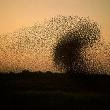Our filtering of information pouring off the network is starting to resemble the activity of a NASDAQ market maker. A market maker is a buyer and seller in a set of tickers on the electronic market. She’s always looking for pools of liquidity, ways to match up a buyer and sellers in whatever trading or crossing network that provides the acceptable transaction.
We are buyers and sellers of information. Techmeme, Delicious, Twitter, Google Reader, Technorati, The Gang and NewsGang, The NY Times, MSNBC, YouTube, iTunes, Facebook, MySpace, CNN, your favorite Blogs, Meg Fowler, Chris Brogan, KR8TR, Karoli, C-SPAN, The New Yorker, The Public Library, News.com, TechCrunch, Mahalo, Google News, Yahoo News, ESPN, Digg, TWIT, Your personal network, and Your friend’s networks are all pushing information into the marketplace. You choose what to buy. You also sell your own writing, photos, music, films, radio into the networks you have access to, the pools the provide the most liquidity.
Just like a Hedge Fund, or a portfolio manager, we try to put together the best portfolio of feeds, and pick the best stories and pieces out of the stream. The term we hear these days is “curator” or “editor.” But the sense of time is not of the long term investor, but rather of the day trader or the market maker.
Comments closed